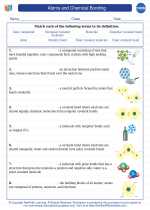Reaction with Acids
When a substance reacts with an acid, several types of reactions can occur. These reactions are important in understanding the behavior of acids and their effects on different materials.
Types of Reactions with Acids:
- Acid-Base Neutralization Reaction
- Acid-Metal Reaction
- Acid-Carbonate Reaction
When an acid reacts with a base, the products are a salt and water. The general equation for this reaction is:
When an acid reacts with a metal, the products are a salt and hydrogen gas. The general equation for this reaction is:
acid + metal → salt + hydrogen gas
When an acid reacts with a carbonate, the products are a salt, water, and carbon dioxide gas. The general equation for this reaction is:
Examples of Reactions with Acids:
1. Acid-Base Neutralization Reaction:
Sodium hydroxide (NaOH) + Hydrochloric acid (HCl) → Sodium chloride (NaCl) + Water (H2O)
Sulfuric acid (H2SO4) + Magnesium (Mg) → Magnesium sulfate (MgSO4) + Hydrogen gas (H2)
Nitric acid (HNO3) + Calcium carbonate (CaCO3) → Calcium nitrate (Ca(NO3)2) + Water (H2O) + Carbon dioxide gas (CO2)
Study Guide:
To understand and master the topic of reactions with acids, it is important to:
- Understand the concept of acids and their properties.
- Learn the different types of reactions that can occur with acids.
- Memorize the general equations for acid-base neutralization, acid-metal, and acid-carbonate reactions.
- Practice balancing chemical equations for reactions with acids.
- Perform experiments to observe and understand the reactions firsthand.
◂Chemistry Worksheets and Study Guides High School. Atoms and Chemical Bonding
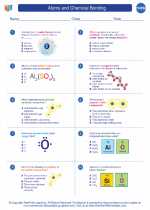
 Worksheet/Answer key
Worksheet/Answer key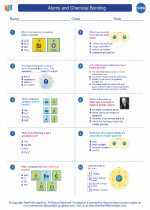
 Worksheet/Answer key
Worksheet/Answer key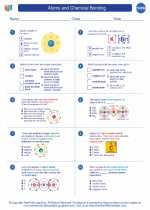
 Vocabulary/Answer key
Vocabulary/Answer key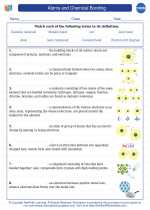
 Vocabulary/Answer key
Vocabulary/Answer key